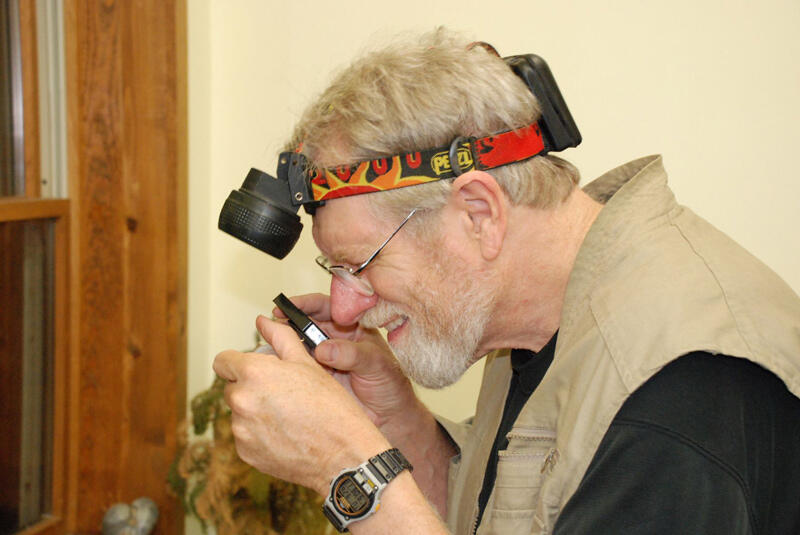George Uetz spider video: youtube.com/watch?v=PpwG5Yx1Skc
UD alumnus George Uetz details his illustrious career in spider biology
With more than 40 years of research experience and nearly 200 publications to his name, George Uetz is an expert in arachnology — the study of spiders. But his illustrious career in this highly specialized field started by chance and has been shaped by serendipitous moments since.

Interested in insects from a young age, Uetz enrolled in a course on arthropods while working toward his undergraduate degree in biology from Albion College. “I got into this class and realized that the professor was an arachnologist, which is a rare thing, and he was going to teach us all about spiders. I was just mortified but I quickly found that if you look at them up close and learn about them then your fear goes away and turns into fascination,” said Uetz.
Following the recommendation of his professors, Uetz applied to graduate school at the University of Delaware where he earned a master of science in entomology and applied ecology from the College of Agriculture and Natural Resources (CANR). After graduation, he spent a summer working in UD’s Ecology Woods where he discovered a true passion for spider research that blossomed into his doctoral studies and led to two opportunities that he considers defining highlights of his career.
First, a chance connection led him to Mexico to assist a fellow graduate student with research on colonial web building spiders, a social behavior rarely seen in arachnids.
“I went because I really didn’t believe it was possible that spiders could live together. As it turns out, there are a small number that do,” said Uetz. “There are 50,000 species of spiders and only about 50 of them have any social behavior like that. These guys were fascinating.”
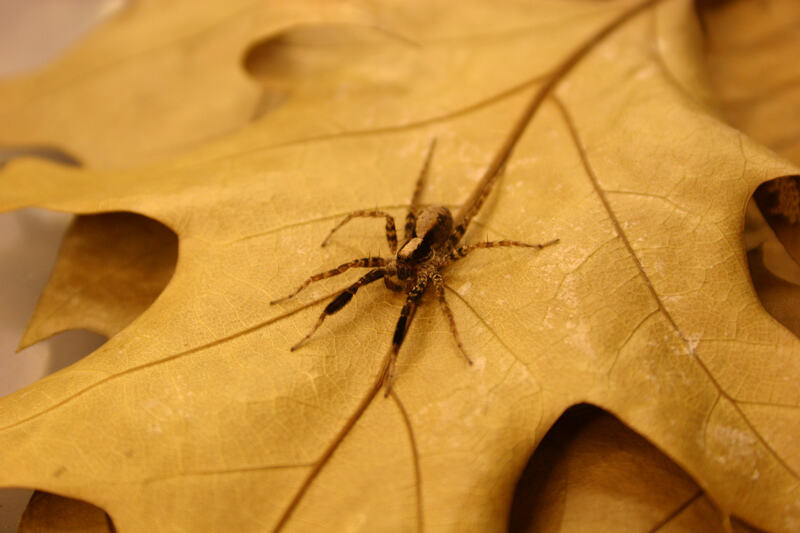
After the other graduate student moved his research focus to fish, Uetz took over the project and continued data collection thanks to grants from the National Geographic Society and the National Science Foundation. “Seventeen years and 33 trips to Mexico later, I had quite a body of work on those colonial web building spiders,” said Uetz.
A second opportunity appeared after Uetz arrived at the University of Cincinnati, where he has worked since 1976. Spider species and insect species are traditionally identified by examining their genitalia. The exoskeletons of arthropods make it such that they must fit together precisely to mate. During his doctoral research study, Uetz found two species whose genitalia were identical but looked and behaved differently. He realized he had discovered a new species and this discovery was the starting point to a career’s worth of research into wolf spider behavior, communication and sexual selection.
Serendipity struck a third time early in Uetz’s career with another discovery that has shaped the way he’s conducted his research in the years since. With his then-graduate student David Clark, Uetz was filming spider courtship behaviors when all of the male specimens — not known for their long lifespans — perished at the same time. Looking for a way to make the most of an unfortunate turn of events, Uetz and Clark went back to the Super 8 film clips they’d taken of the male spiders before their demise. While projecting the film onto the wall, Clark noticed the female spiders responding. Uetz and Clark then used a piece of velum on the side of the spider containers as a small projection screen, displayed the images and recorded the courtship responses of the remaining females.
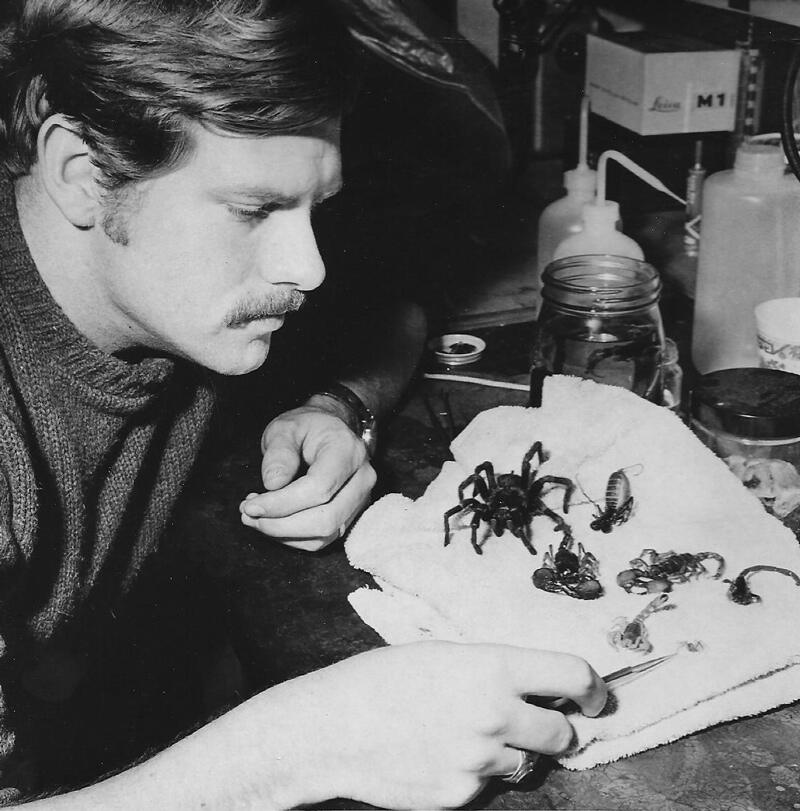
While many studies at the time were focused on female mate choice, those studies were limited because the males rarely started courtship behavior at the same time and the females often selected the first male to court. The use of video clips allowed Uetz and Clark to display two males at once, avoiding the inherent experimental bias of unsynchronized timing and digging deeper on the question of mate selection. It also allowed them to digitally manipulate the videos, pinpointing various aspects of the courtship behavior of a virtual spider to which female spiders respond. Lauded as a pioneering step forward in the study of animal behavior, similar techniques are now used to study behavioral ecology of fish, birds, crustaceans, toads, insects and more.
As the decades passed and technology evolved, Uetz updated his equipment. Today, he still studies the multimodal communication exhibited by the wolf spiders he studied as a graduate student. To display video, Uetz and his research team use iPod screens so that images appear lifesize to a spider. To measure and record spider acoustics, they use a laser vibrometer, an expensive and very sensitive piece of equipment often used in spyware. And to measure movement and vibrations, his team uses a Piezoelectric vibrometer, a piece of equipment the size of a dime that can be attached to the back of a leaf and record or play back vibrations to the spider standing above. Combined, the equipment allows the team to investigate the most important aspects of multiple sensory modes used in courtship behavior and mate selection.
Uetz’s work has led to a greater understanding and appreciation for spiders not only as valuable animals to study in their own right but also as model organisms with lessons that can be extrapolated to others in the animal kingdom. With brains the size of poppy seeds, wolf spiders' intricate use of multimodal communication is nothing short of astonishing and Uetz is at the forefront of uncovering the secrets to their ecology.
“Dr. Uetz has earned global recognition as the father of spider communication, sensory modes, and sexual selection. Arachnology is a small discipline — far smaller than the size or ecological importance the Araneae deserve — and the study of spider behavior is even more specialized,” said Doug Tallamy, TA Baker Professor of Agriculture and Natural Resources, who nominated Uetz to receive a 2021 CANR Distinguished Alumni Award. “Dr. Uetz has led the field from the earliest days of his career, and has made several seminal contributions to the behavioral ecology of spiders, including training most of the top arachnologists in the field today.”
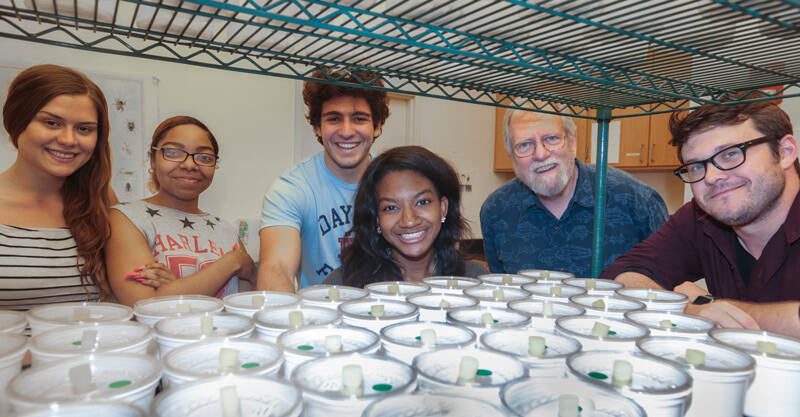
Uetz fondly remembers his time at UD where his education was grounded in organismal biology and he learned about the global importance of insects. He spent summers working on insect surveys across the state with Cooperative Extension agents, using light traps to collect moths, flies and beetles, and delighted when the researchers let students divvy up the specimens at the end of each survey. He’s had the details of his bug collection memorized since college, even though the names of some insect families have changed since his time as a student in the late 1960s and 70s. In Cincinnati, where he now teaches invertebrate biology, Uetz often brings out his collection which he notes is made up almost entirely of specimens from Delaware.
Uetz experienced nature beyond UD’s entomology department, too. He worked to help band great blue herons, tallied fish at a power plant as part of a fish impingement survey, and counted mites on soybean leaves and beetles on asparagus. He credits mentors at UD like Paul Catts, a favorite processor and accomplished biological illustrator, with helping him explore myriad career opportunities within the natural sciences. Catts taught Uetz medical and forensic entomology and he has used those lessons learned for stints as a coroner’s consultant at various points throughout his career.
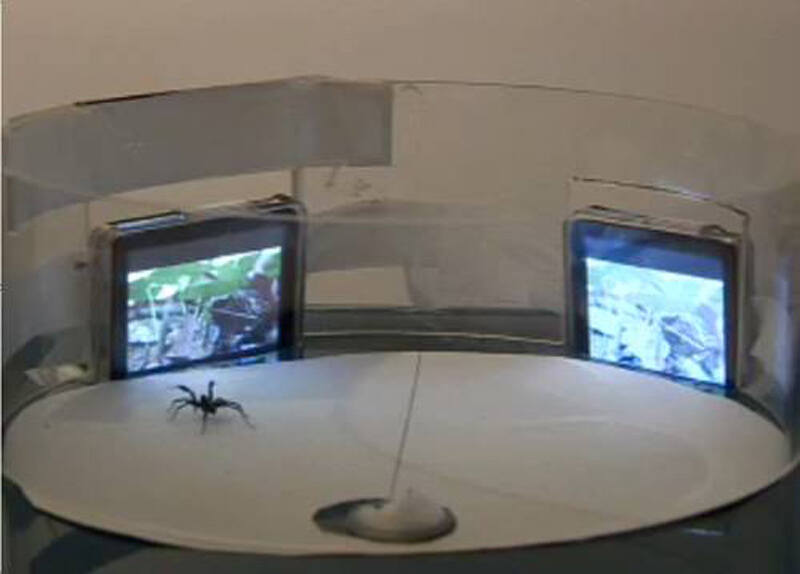
Across campus, Uetz was involved in the Graduate Council, took part in protests against the Vietnam War, and served as a leader in UD’s first Earth Day celebration in 1970, an experience that instilled in him a lifelong commitment to the environment.
That commitment to the environment inspired Uetz to team up with a local lawyer and New Castle County Councilman as they fought to secure the future of White Clay Creek and to oppose the building of a refinery on wetlands in southern New Castle County. Later, when that lawyer ran his first Senate campaign in 1972, Uetz stayed on board as an environmental adviser and speech writer. He produced white papers that helped lay the foundation for the environmental policies and viewpoints of this early-career politician who we now know as the 46th President of the United States, Joseph R. Biden, Jr.
Advice for future scientists
Although much has changed about college life since Uetz was a UD student, the living world is still perilously threatened and Uetz said future ecologists must be ready to address that challenge. He encourages aspiring scientists to explore the multitude of resources available online but also hopes they get out of the classroom as early and as often as possible to benefit from the same breadth of experience he gained during his time as a student. Developing a deep connection and commitment to nature will make new graduates more competitive when they enter the job market, he said. And Uetz knows that Delaware can help foster that connection, especially for aspiring entomologists.
“When I came here [to Cincinnati], I met my wife and she had noticed that one of my papers was about the spiders of Delaware so she asked me what was so special about Delaware,” said Uetz. “I told her that it’s a small state that you can traverse in a very short period of time but because of its orientation, Delaware varies in latitude and climate. In the northern part of the state, half of it is above the fall line so you have forests and hills. In the southern part, it’s flat and mostly agricultural or coastal. Those are very different biomes and they provide very different slices of the natural world to see. I’m grateful that I had the opportunity to experience that in Delaware. My education was a real eye-opening experience and that’s what I hope for students of this generation.”
